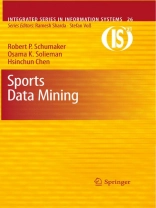Data mining is the process of extracting hidden patterns from data, and it’s commonly used in business, bioinformatics, counter-terrorism, and, increasingly, in professional sports. First popularized in Michael Lewis’ best-selling Moneyball: The Art of Winning An Unfair Game, it is has become an intrinsic part of all professional sports the world over, from baseball to cricket to soccer. While an industry has developed based on statistical analysis services for any given sport, or even for betting behavior analysis on these sports, no research-level book has considered the subject in any detail until now.
Sports Data Mining brings together in one place the state of the art as it concerns an international array of sports: baseball, football, basketball, soccer, greyhound racing are all covered, and the authors (including Hsinchun Chen, one of the most esteemed and well-known experts in data mining in the world) present the latest research, developments, software available, and applications for each sport. They even examine the hidden patterns in gaming and wagering, along with the most common systems for wager analysis.
İçerik tablosu
Sports Data Mining: The Field.- Sports Data Mining Methodology.- Data Sources for Sports.- Research in Sports Statistics.- Tools and Systems for Sports Data Analysis.- Predictive Modeling for Sports and Gaming.- Multimedia and Video Analysis for Sports.- Web Sports Data Extraction and Visualization.- Open Source Data Mining Tools for Sports.- Greyhound Racing Using Neural Networks: A Case Study.- Greyhound Racing Using Support Vector Machines: A Case Study.- Betting and Gaming.- Conclusions.
Yazar hakkında
Dr. Robert Schumaker is an Assistant Professor in Information Systems at Iona College. Rob’s overall research interests involve the uses of technology to acquire, deliver and make predictions in a variety of Business-related environments. These interests further branch into computer mediated communications, design science, human computer interfaces, machine learning algorithms, natural language processing, technology acceptance models and textual data mining. His recent research has focused on Sports Knowledge Management and Data Mining of relevant data from Sports-related databases and producing accurate predictions that can provide an edge to sports organizations and gamblers alike. Using the Moneyball style philosophy, this project analyzes the use of different machine learning techniques to predict outcomes of sporting events.
He has authored or co-authored many journal articles, including ACM Transactions on Information Systems, Decision Support Systems, IEEE Systems, Man and Cybernetics – Part A and Communications of the ACM.
Osama K. Solieman attended the University of Arizona graduating with a BS in Computer Science in 2003. In 2006, he received a MS in Management Information Systems where he was also the lead researcher on a database project for the Department of Electrical & Computer Engineering. Currently, he is an IT Consultant regularly working with Fortune 500 companies and traveling extensively around the world. He remains an avid sports fan and is active in his community.
Hsinchun Chen is Mc Clelland Professor of Management Information Systems (MIS) at the Eller College of the University of Arizona and Andersen Consulting Professor of the Year (1999). He is the author of 15 books and more than 200 articles covering knowledge management, digital library, homeland security, Web computing, andbiomedical informatics in leading information technology publications. He serves on ten editorial boards, including: Journal of the American Society for Information Science and Technology, ACM Transactions on Information Systems, IEEE Transactions on Systems, Man, and Cybernetics, IEEE Transactions on Intelligent Transportation Systems, International Journal of Digital Library, and Decision Support Systems. He has served as a Scientific Advisor/Counselor of the National Library of Medicine (USA), Academia Sinica (Taiwan), and National Library of China (China). Dr. Chen founded The University of Arizona Artificial Intelligence Lab in 1990. The group is distinguished for its applied and high-impact AI research. Since 1990, Dr. Chen has received more than $20M in research funding from various government agencies and major corporations. He has been a PI of the NSF Digital Library Initiative Program and the NIH NLM’s Biomedical Informatics Program. His group has developed advanced medical digital library and data and text mining techniques for gene pathway and disease informatics analysis and visualization since 1995. Dr. Chen’s nanotechnology patent analysis works, funded by NSF, have been published in the Journal of Nanoparticle Research. His research findings were used in the President’s Council of Advisors in Science and Technology’s report on ‘The National Nanotechnology Initiative at Five Years: Assessment and Recommendations of the National Nanotechnology Advisory Panel.’ Dr. Chen’s work also has been recognized by major US corporations and been awarded numerous industry awards for his contribution to IT education and research, including: AT&T Foundation Award in Science and Engineering and SAP Award in Research/Applications. Dr. Chen has been heavily involved in fostering digital library, medical informatics, knowledge management, and intelligence informatics research and education in the US andinternationally. He has been a PI for more than 20 NSF and NIH research grants since 1990. Dr. Chen is conference chair of ACM/IEEE Joint Conference on Digital Libraries (JCDL) 2004 and has served as the conference general chair or international program committee chair for the past six International Conferences of Asian Digital Libraries (ICADL), 1998-2005. He has been instrumental in fostering the ICADL activities in Asia. Dr. Chen is the founder and also conference co-chair of the IEEE International Conference on Intelligence and Security Informatics (ISI), 2003-2006. The ISI conference has become the premiere meeting for international, national, and homeland security IT research. Dr. Chen is an IEEE fellow.












